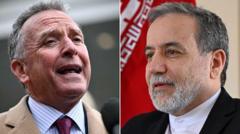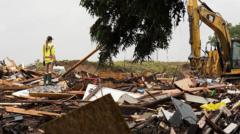The dialogue, described as "constructive," represents the highest-profile negotiation since the US exited the nuclear deal in 2018, paving the way for future discussions.
**US and Iran Begin Talks Over Nuclear Program Amidst Tensions**

**US and Iran Begin Talks Over Nuclear Program Amidst Tensions**
Talks in Oman mark a significant step in diplomatic relations as both nations strive for a nuclear agreement.
Both Iran and the United States have concluded a first round of talks in Oman concerning Tehran's nuclear program, the most significant meeting between the two nations since 2018. Labeling the discussions as "constructive," both sides confirmed that a subsequent round of talks is scheduled for next week, with the US regarding "direct communication" as critical for forging a possible agreement.
The backdrop of these negotiations stems from President Donald Trump’s withdrawal of the US from the Iran nuclear deal in 2018, coupled with his assertion that a "better" deal could be achieved. The initial talks lasted two and a half hours and were characterized as respectful, setting a positive tone for future discussions. Iranian Foreign Minister Abbas Araghchi remarked on the civil atmosphere, noting that no inappropriate language was used during the meeting.
Significantly, while the US and Iranian delegations worked from separate rooms, messages were relayed through Oman’s Foreign Minister Badr bin Hamad al-Busaidi. Their discussions marked a departure from stringent criticisms that have previously marred US-Iran relations. Despite Trump’s warnings regarding military actions should talks fail, this preliminary engagement has provided a platform for what both sides hope will be productive negotiations.
The White House stated that the discussions were positive, hinting at Witkoff’s commitment to resolving differences via diplomacy. As Araghchi underscored the necessity of a “fair agreement,” the upcoming talks may occur in a different venue, still under Omani mediation. Both parties aim to avoid extended negotiations devoid of tangible progress, with Araghchi emphasizing the importance of practical outcomes.
Key issues revolve around the nature of a prospective agreement. The US seeks to curb Iran's nuclear aspirations, while Iran desires sanctions relief in exchange for limiting its nuclear program, albeit without total dismantlement. Mixed signals arise from US-Israeli collaborations, where Israeli Prime Minister Benjamin Netanyahu advocates for a "Libya-style deal"—a proposition Iran staunchly rejects, reiterating that its nuclear activities are peaceful and defensive in nature.
Ahead of these negotiations, tensions escalated with increased military mobilization by the US and fresh sanctions on Iran. While Iran insists its nuclear program will not be weaponized, past breaches of the 2015 deal’s restrictions have added urgency to the current talks. The goal remains to navigate this intricate landscape towards a cohesive agreement amid ongoing geopolitical pressures.
The backdrop of these negotiations stems from President Donald Trump’s withdrawal of the US from the Iran nuclear deal in 2018, coupled with his assertion that a "better" deal could be achieved. The initial talks lasted two and a half hours and were characterized as respectful, setting a positive tone for future discussions. Iranian Foreign Minister Abbas Araghchi remarked on the civil atmosphere, noting that no inappropriate language was used during the meeting.
Significantly, while the US and Iranian delegations worked from separate rooms, messages were relayed through Oman’s Foreign Minister Badr bin Hamad al-Busaidi. Their discussions marked a departure from stringent criticisms that have previously marred US-Iran relations. Despite Trump’s warnings regarding military actions should talks fail, this preliminary engagement has provided a platform for what both sides hope will be productive negotiations.
The White House stated that the discussions were positive, hinting at Witkoff’s commitment to resolving differences via diplomacy. As Araghchi underscored the necessity of a “fair agreement,” the upcoming talks may occur in a different venue, still under Omani mediation. Both parties aim to avoid extended negotiations devoid of tangible progress, with Araghchi emphasizing the importance of practical outcomes.
Key issues revolve around the nature of a prospective agreement. The US seeks to curb Iran's nuclear aspirations, while Iran desires sanctions relief in exchange for limiting its nuclear program, albeit without total dismantlement. Mixed signals arise from US-Israeli collaborations, where Israeli Prime Minister Benjamin Netanyahu advocates for a "Libya-style deal"—a proposition Iran staunchly rejects, reiterating that its nuclear activities are peaceful and defensive in nature.
Ahead of these negotiations, tensions escalated with increased military mobilization by the US and fresh sanctions on Iran. While Iran insists its nuclear program will not be weaponized, past breaches of the 2015 deal’s restrictions have added urgency to the current talks. The goal remains to navigate this intricate landscape towards a cohesive agreement amid ongoing geopolitical pressures.



















